Is Atmanirbhar Bharat Compatible with Globalisation, Questions Outgoing US Ambassador Kenneth Juster

views
As the Trump tenure comes to an end, US ambassador Kenneth Juster is also winding up his three-year stint in India. In his farewell address on Tuesday, he expressed disappointment at the “frictions and frustrations on the trade and investment front”, saying US and India could not even conclude a small trade deal “despite persistent effort”.
The ambassador highlighted what he believed were the problem areas — growing restrictions on market access for certain US goods and services, increasing tariffs, new limitations on the free flow of data and less than predictable environment for investors.
It’s significant to note that a few weeks ago, External Affairs Minister S Jaishankar had said that while India was serious about striking a trade deal with US, it was the Trump administration that had blocked it.
News18.com has learnt that the current US administration was surprised by the EAM’s statement. In fact, the US side felt that a trade deal could have been achieved so much so that they had sent lawyers and prepared a draft as well at the height of negotiations. However, sources told News18.com that what US got back from the Indian side had so many red lines that moving forward became difficult. The US IT sector also seems to have objected to what they called restriction of market access.
Meanwhile, like the EU, ambassador Juster also seemed to suggest that even the US views India’s call for Atmanirbhar Bharat or ‘Self-Reliant India’ as protectionist. He said that though it is for India to decide whether it is compatible with globalization, their experience was that “excessively managed markets tend to create inefficiencies, leading to slower growth”.
India has been trying to dispel concerns over the call for ‘Atmanirbhar Bharat’. Last year, foreign secretary Harshvardhan Shringla had said that “the call for Atmanirbhar Bharat is not about reverting to economic isolationism. Its essential aim is to ensure India’s position as a key participant in global supply chains. Through building capacities at home, we also intend to contribute to mitigating disruptions in global markets”.
On the other hand, Juster said that as the US and other companies find it increasingly difficult to operate in China or seek to diversify away from Chinese-led supply chains, India has a strategic opportunity to become an alternative destination for manufacturing investments in Indo-Pacific region, but for “seizing this opportunity” the Indian government may well need to take further action.
On another important issue of possible CAATSA sanctions against India due to the S-400 deal with Russia, the ambassador didn’t give a direct response but said the sanctions were not designed to harm friends and partners. However, he added that while India may like to keep its options open, it may be required to ultimately make choices in favour of “trusted partners”.
Ambassador Juster also underlined what connects the two democracies – India and US. He said both have benefitted from diverse populations and that “unity in diversity” is a promise guaranteed by our constitutions and a strong factor that helps Americans relate to India. He added that while “neither of us is – or has been – perfect, we understand that preserving our commitment to diversity and tolerance is important to maintaining our status in the world and the strength of our bilateral relations”.
The ambassador was emotional by the end of his farewell speech and teared up while delivering the last few lines of his address before leaving India.
Read all the Latest News, Breaking News and Coronavirus News here




















Comments
0 comment